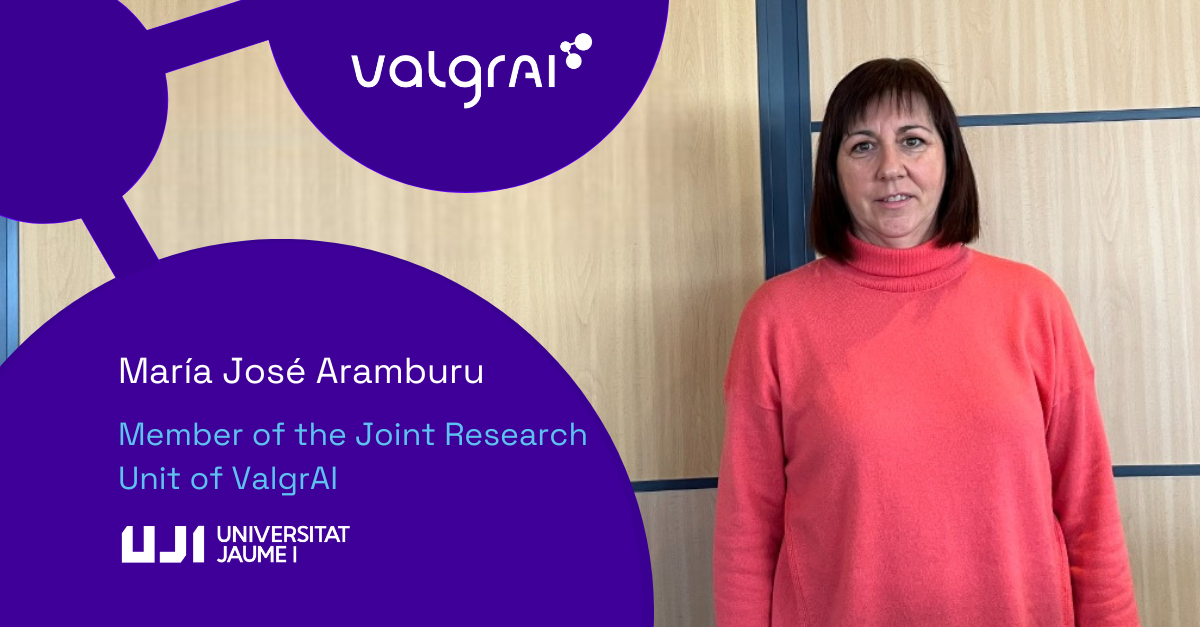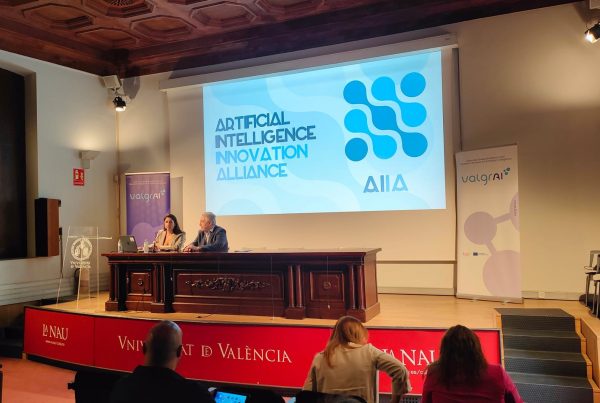We interviewed María José Aramburu, professor of computer science and artificial intelligence at the Jaume I University of Castellón (UJI) and member of the ValgrAI Joint Research Unit. Aramburu is an expert in the exploitation of heterogeneous data and advanced business intelligence applications. In the interview, she will explain how to define Artificial Intelligence (AI), what her current challenges are, how ethical and fair AI can be guaranteed, what her experience as a woman in the sector has been like and what we can expect from the Master in Intelligent Systems of Jaume I University.
Professional career
My professional academic career began in 1991 when I joined the recently created Universitat Jaume I of Castellón where I currently hold the post of Professor of Computer Science and Artificial Intelligence. My main research interests include the exploitation of heterogeneous data and advanced business intelligence applications. All my research has been developed as a member of the Temporary Knowledge Bases group of this same university.
Miembros de la Unidad Mixta de Investigación de ValgrAI de la Universitat Jaume I de Castelló
You belong to the Mixed Unit of ValgrAI researchers, being the coordinator of the UJI. What is your role?
I am the link between ValgrAI and the research carried out at the Universitat Jaume I in the field of AI. In addition to collaborating in the organization of ValgrAI, my main role is to encourage this entire group to participate and propose activities, as well as to inform them about the possibilities that ValgrAI offers to boost their research and promote our studies related to AI.
What is your contribution to ValgrAI?
At the Universitat Jaume I we have research groups that work on new imaging technologies, pattern recognition, machine learning, and visual engineering, as well as other groups, focused on intelligent robotics, high performance for AI, knowledge representation, and big data and data mining applications. We also have a degree in Robotic Intelligence and a master’s degree in Intelligent Systems.
Everyone is talking lately about AI, but it is a concept that is confusing or not fully understood. How is AI defined?
Artificial Intelligence is usually defined as the ability of a machine to imitate intelligent human behavior. It includes technologies such as natural language processing, machine learning, neural networks, knowledge representation, and computer vision.
Artificial Intelligence is usually defined as the ability of a machine to imitate intelligent human behavior.
Although AI technologies are not new, in recent years they have been promoted in different ways. On the one hand, our personal devices are generators of data with great potential value for many AI applications. Another important driver of AI is the high availability of new technologies for storing and processing large volumes of data. The storage and computing capabilities of our current computer systems are incomparable to those of just a few years ago. The great advances that have occurred in algorithms for intelligent data processing is the third of the drivers of AI. In recent times, without forgetting automatic reasoning and robotics, automatic learning (i.e. machine learning) has been the protagonist in most of the applications and advances of AI.
What would be the current challenge of artificial intelligence?
From my point of view, organizations that want to benefit from modern AI should give enough importance to the problem of collecting and managing training data. Machine learning algorithms require quality and well-prepared data, and the reason is simple, because they learn from it. To achieve this, it is necessary to spend many hours collecting, transforming, validating and cleaning the data, before it can be used with guarantees of success in a predictive mathematical model. Similarly, organizations must ensure that their members securely generate and use the right data at the right time. Good data governance is the only way to make it the knowledge that organizations need.
Can ethical and fair artificial intelligence be guaranteed?
I believe that if you want, you can. We must invest efforts in studying the possible causes that prevent AI from being ethical and fair, and in improving the tools that allow us to eliminate biases and absences. Likewise, it is important to educate young people to make good use of these technologies, as well as to adopt measures so that, like the rest of the technologies, the main mission of AI is to help society in general and in the best possible way, according to the circumstances of each one.
The Master in Intelligent Systems at the Universitat Jaume I has been completely renewed this year. What can we expect from him?
The master’s degree is part of what would be the technologies associated with the development of intelligent systems such as robotic systems and intelligent tools for interaction and information visualization. The master’s subjects emphasize the study of information systems, pattern recognition, interaction, robotic systems and the architectures and networks capable of supporting them.
In addition, all subjects are taught in English and some students may opt for a dual training stage in a company in the sector. With this option, the end-of-degree project and a specific subject can be carried out in the real environment of a company and under the protection of a paid work contract. We are the first Valencian university to offer these two options that we hope will improve the capacity for internationalization, job placement and the general training of our graduates.
All subjects are taught in English and some students may opt for a dual training stage in a company in the sector
After more than 30 years in the world of research and teaching, what has it been like to develop your career, as a woman, in a predominantly male sector?
40 years ago I started studying computer engineering, and the strangest thing is that at that time there was not a gender gap as big as now, so at no time have I felt isolated or out of place. It is true that for us there are periods in which reconciling family with work has been especially complicated, especially during our children’s early childhood. However, in the end, the most important thing has been to be able to participate in a team with a clear purpose and willing to adapt to the circumstances of each of its members, depending on the moment in their lives in which they find themselves.
What would you do as a woman who has dedicated her life to this field to promote the study of AI among other women?
I think it is necessary to explain to young students that computer engineering in general, and artificial intelligence in particular, are sectors in which they can develop interesting and rewarding professional careers. In addition, based on my teaching and research experience, I can affirm that women are perfectly capable of enjoying and standing out in these areas. For example, the best records of the last promotion of the computer engineering and computational mathematics degrees at the Universitat Jaume I were from two girls.
que es necesario explicar a las jóvenes estudiantes que la ingeniería informática en general, y la inteligencia artificial en particular, son sectores en los que pueden desarrollar unas carreras profesionales interesantes y gratificantes. Además, en base a mi experiencia tanto docente como investigadora, puedo afirmar que las mujeres estamos perfectamente capacitadas para disfrutar y destacar en estos ámbitos. Por ejemplo, los mejores expedientes de la última promoción de los grados de ingeniería informática y de matemática computacional de la Universitat Jaume I, fueron de dos chicas.
Women are perfectly trained to enjoy and stand out in these areas.
Computer science consists of using technology to build solutions to specific problems, with the satisfaction that is experienced every time one of these challenges is overcome. In addition, we must banish the myth that it is a job that separates you from society since most projects are carried out in teams in which collaboration is essential. In these professions, even after leaving university, there is always a lot to learn and a lot to advance, so your careers will be full of opportunities to further develop.
However, I believe that it is mostly the private sector companies that need to make an effort to understand that women have a lot of talent to contribute. They must value and facilitate the incorporation of women in their workforce, with measures that favor their participation without having to give up other essential facets of their lives. I find it absurd that with the great need there is for qualified AI personnel, the great talent of women can be given up in exchange for an unlikely improvement in productivity.
In summary…
The five key points from the interview with María José Aramburu:
- The definition of artificial intelligence as the ability of a machine to mimic intelligent human behavior, which includes technologies such as natural language processing, machine learning, neural networks, knowledge representation, and computer vision.
- The current challenge of artificial intelligence is the collection and management of training data, which must be of good quality and well-prepared, before it can be used in a predictive mathematical model with guarantees of success.
- It is possible to guarantee an ethical and fair artificial intelligence if the possible causes that prevent it from being so are studied and the tools that allow us to eliminate biases and absences are improved, in addition to educating young people on the proper use of these technologies.
- The master’s degree in Intelligent Systems at the Universitat Jaume I is framed in the study of information systems, pattern recognition, interaction, robotic systems, and the architectures and networks capable of supporting them, with the possibility of taking a dual training stage in a company in the sector.
- Organizations that want to benefit from modern AI must ensure that their members are confidently generating and using the right data at the right time, and spending time collecting, transforming, validating, and cleaning the data so that it becomes the insights that organizations use. organizations need.





